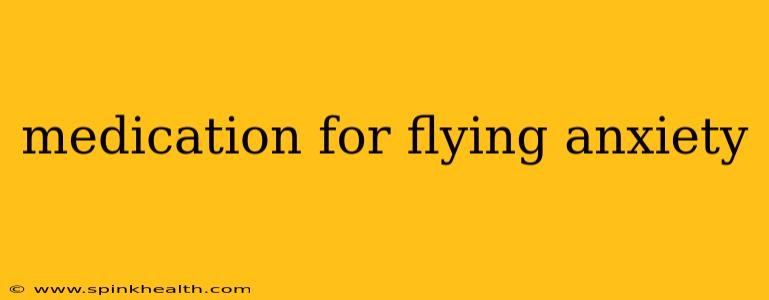The roar of the engines, the feeling of weightlessness, the confined space – for many, flying is a source of immense anxiety. This isn't just a mild nervousness; it's a full-blown fear that can significantly impact a person's life, limiting travel opportunities and causing considerable distress. But what if I told you there's help? Medication can play a crucial role in managing flying anxiety, allowing you to reclaim your freedom and enjoy the journey. This isn't about eliminating the fear entirely – it's about managing it effectively, making flying a manageable experience instead of a terrifying ordeal.
My journey started with a crippling fear of flying. Business trips became a nightmare, family vacations a source of immense stress. I tried everything – relaxation techniques, guided meditations – but the fear persisted. Then, I finally sought professional help, and my life changed. Let's explore the options available and how they work.
What Medications are Used to Treat Flying Anxiety?
Several medications can be helpful in managing flying anxiety, and the best choice depends on individual circumstances and the severity of the anxiety. A doctor or psychiatrist is essential in making this determination. Common options include:
-
Benzodiazepines: These are short-acting medications known for their quick anxiety-reducing effects. They're often prescribed for single-use situations like air travel. Alprazolam (Xanax) and Lorazepam (Ativan) are examples. Important Note: These should only be taken under the guidance of a medical professional, as they can be habit-forming.
-
Beta-blockers: These medications don't directly target anxiety but work by reducing physical symptoms like a racing heart, trembling hands, and sweating – all common manifestations of anxiety. Propranolol is a commonly used beta-blocker.
How Long Before My Flight Should I Take Medication?
This is a crucial question, and the answer depends entirely on the medication prescribed and its onset of action. Your doctor will give you precise instructions, but generally, it's not something you take at the airport. Benzodiazepines, for example, often need to be taken hours before your flight to achieve the desired effect. Never take medication without consulting your doctor and following their instructions carefully.
Are There Any Side Effects?
Yes, all medications come with potential side effects. Benzodiazepines, while effective, can cause drowsiness, dizziness, and confusion. Beta-blockers may lead to low blood pressure or fatigue. Your doctor will discuss these risks and help you weigh them against the benefits of managing your anxiety. Open communication with your doctor is crucial.
What If I'm on Other Medications?
This is incredibly important to communicate to your doctor. Interactions between medications can occur, so it's essential that your doctor is aware of your complete medication history. Never self-medicate or adjust your dosages without professional guidance.
What Are the Alternatives to Medication?
While medication can be incredibly effective, it isn't the only solution. Cognitive Behavioral Therapy (CBT) is a highly effective therapeutic approach that helps individuals identify and change negative thought patterns and behaviors contributing to their anxiety. Relaxation techniques, such as deep breathing exercises and mindfulness, can also be beneficial.
Is it Safe to Fly While on Medication?
Flying while on medication is generally safe, provided you follow your doctor's instructions carefully. However, always inform the airline staff about any medications you're taking, especially if you're concerned about potential side effects.
Can I Get Medication for Flying Anxiety on the Day of My Flight?
While some clinics offer same-day appointments for anxiety, it's generally advisable to address flying anxiety well in advance of your travel date. Getting a prescription and becoming familiar with your medication's effects is a far better approach than trying to secure medication at the last minute.
My experience with medication helped immensely. It didn't erase my fear, but it reduced it to a manageable level. Combined with therapy and relaxation techniques, it allowed me to travel confidently and enjoy my flights. The key is proactive planning, open communication with your doctor, and a commitment to finding the right solution for your unique needs. Remember, conquering your fear of flying is achievable.

